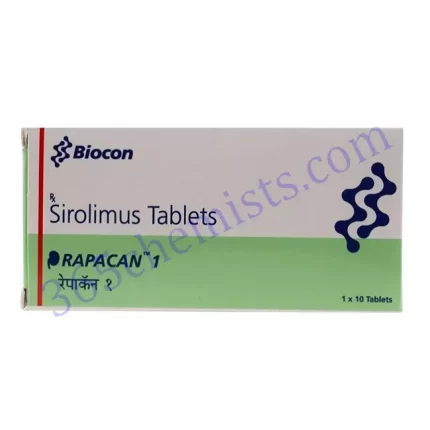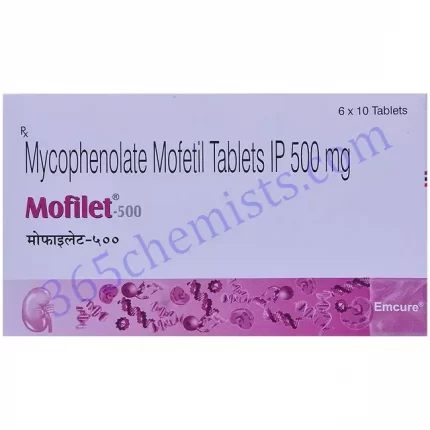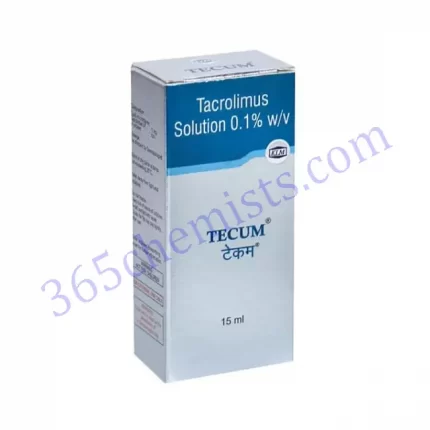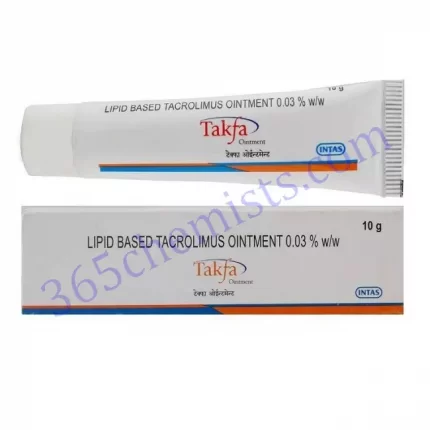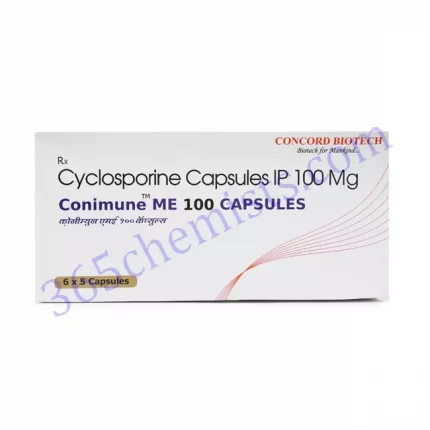Rapacan 2mg Tablet
It is common practise to prescribe sirolimus, the active component of Rapacan 2mg Tablet, to patients who have undergone organ transplantation because sirolimus acts as an immunosuppressive agent. This medication, which is primarily employed for the purpose of preventing organ rejection, is a member of a group of pharmaceuticals known as mTOR inhibitors. Tablets of Rapacan 2mg are available for patients to purchase, and the medication is typically prescribed in conjunction with other immunosuppressant drugs. In the following paragraphs, we will provide a comprehensive analysis of Rapacan 2mg Tablet, which will cover its mode of action, indications, dosage, potential adverse effects, and precautions.
Mechanism of Action
The active component in Rapacan 2mg Tablet is called sirolimus, and it works by inhibiting the mammalian target of rapamycin, also known as mTOR. mTOR is a protein kinase that is involved in the growth and proliferation of cells. By blocking the signalling pathway that leads to T-lymphocyte activation and proliferation, sirolimus is able to dampen the immune response. This is accomplished by the drug’s ability to inhibit mTOR. In organ transplant recipients, this immunosuppressive action helps to prevent the rejection of transplanted organs.
Indications
Patients who have received kidney transplants are the target population for the primary application of the Rapacan 2mg Tablet, which is used for the prevention of organ rejection. In order to achieve the highest level of immunosuppression possible, it is typically administered in conjunction with a number of other immunosuppressive drugs, such as calcineurin inhibitors (like tacrolimus), as well as corticosteroids. Combination therapy makes it possible to take lower doses of individual medications, which in turn reduces the likelihood of experiencing adverse effects while still providing sufficient immunosuppression.
Dosage and Administration
It is possible for the dosage of Rapacan 2mg Tablet to change depending on a variety of factors, including the patient’s weight, the particular treatment regimen that has been prescribed by the healthcare provider, and the kind of organ transplant that has been performed. It is extremely important to take the medication exactly as directed by the healthcare professional, including paying close attention to the dosage and how it should be administered. The recommended manner of administration for the Rapacan 2mg Tablet is orally, either one hour before or two hours after a meal. It is recommended that the tablet be taken in its entirety with a full glass of water. It is best to avoid forgetting to take a dose, but if this does happen, the missed dose should be taken as soon as it is remembered, unless it is getting close to the time of the next dose that is scheduled.
Related Product
Rapacan 1mg Capsule
Rapacan 2mg Capsule
Side Effects
Just like any other medication, Rapacan 2mg Tablet has the potential to cause a variety of unwanted side effects. Ulcers in the mouth, diarrhoea, rashes, swelling, high blood pressure, and an increased risk of infection are some of the most frequently reported adverse effects of this medication. These unwanted effects are typically manageable and have a tendency to become less severe over time. On the other hand, it is essential to make a prompt report to the healthcare provider of any side effects that continue or become severe. If you use Rapacan 2mg Tablet for an extended period of time, there is a possibility that the risk of developing certain complications, such as kidney dysfunction and impaired wound healing, will increase. It is recommended that the patient’s kidney function be monitored frequently and that they maintain close contact with their healthcare provider.
Precautions
Before beginning treatment with Rapacan 2mg Tablet, medical professionals should evaluate the patient’s medical history and consider the potential risks and benefits that may be associated with the medication. It is not recommended that patients who have a history of hypersensitivity to sirolimus or any of its components take the Rapacan 2mg Tablet. It is essential to provide the healthcare provider with accurate information regarding any preexisting medical conditions, such as liver or kidney disease, as adjustments to the prescribed dosage may be required. Patients taking sirolimus should take precautions to prevent sunburn and skin cancer by avoiding exposure to sunlight and other forms of ultraviolet radiation.
Conclusion
The medication sirolimus, which is found in the Rapacan 2mg Tablet, is an indispensable tool for preventing organ rejection in kidney transplant recipients. Rapacan 2mg Tablet is an essential component in the process of preserving the viability of transplanted organs. This tablet works by inhibiting the immune response by way of the mTOR pathway. It is common practise to prescribe it in conjunction with other immunosuppressive drugs, and it needs to be monitored on a consistent basis in order to ensure the best possible therapeutic outcomes and reduce the risk of adverse reactions. The success rates of kidney transplantation have been significantly improved thanks to Rapacan 2mg Tablet, and post-transplant care will continue to prioritise its use of this medication.



